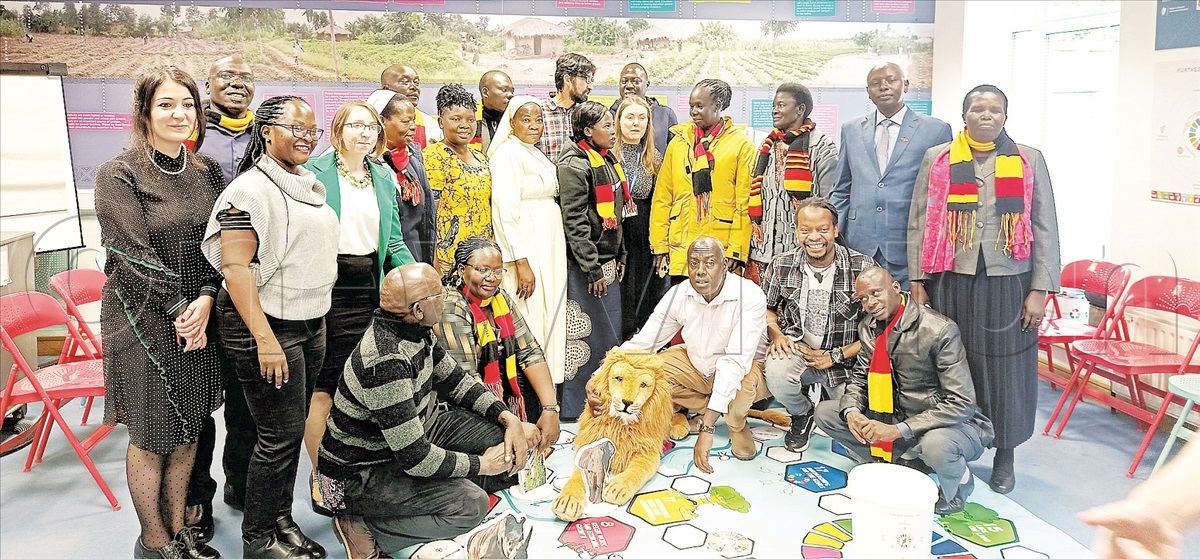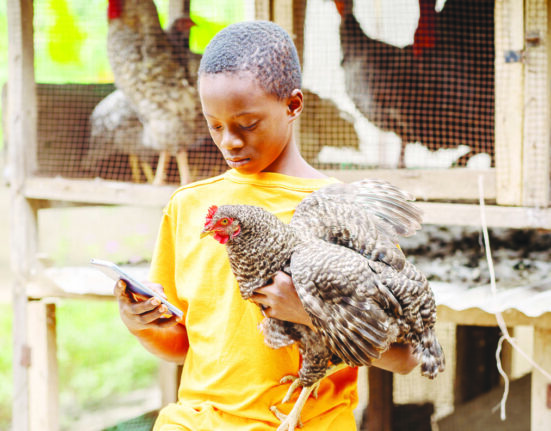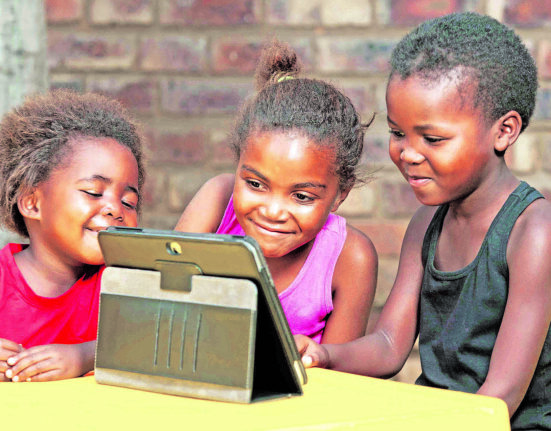(This article was first published in the New Vision on October 19, 2022)
Stars of the 2019 and 2020 Teachers Making A Difference competition returned to Uganda last week, after a 10-day study tour to Ireland. John Eremu was part of the team and now reports about the excitement, the lessons learnt and the big plans the teachers have for their schools.
After a three-year wait, the 11 teachers finally jetted out of Entebbe International Airport on the night of September 28, 2022. They should have been 12. However, Sr. Teopista Namukasa, of Mary Immaculate Girls’ Primary School Kalungu, the overall winner of the 2019 competition, could not travel on doctor’s advice. Before departure, the Ambassador of Ireland in Uganda, Kevin Colgan, hosted the teachers to a fun-filled reception at his residence in Kololo.
At 6:43am, Flight Captain Jan Van Teeffelen announced the arrival of the KLM Airbus A330-200 at Amsterdam Schiphol airport in the Netherlands. The excitement began immediately. The delayed connecting flight to Dublin provided more time for the teachers, the majority of whom were flying for the first time, to explore the sprawling 27.87 square-kilometre airport, the fifth busiest in the world, with connections to some 319 destinations.

Lessons From The Irish Education System
The Irish seem to have discovered long ago what former South African president Nelson Mandela told African leaders: “Education is the most powerful weapon which you can use to change the world.”
As such, the Irish education system is anchored on producing critical thinkers and global citizens. Learning is fun, with philosophy and problem-solving skills in real-world situations instilled in the learners right from an early age. The delivery of the curriculum is highly child-centred, with the learners involved in finding solutions.
For instance, conflict among the learners is turned into an opportunity to learn about conflict resolution, with the conflicting parties themselves engaged to find a solution.
Vocational education and values, such as global citizenship (respect for all), discipline and time management are emphasised.
Prof. Emer Ring, the dean of early childhood and teacher education at the Mary Immaculate College (MIC), says because the government values education, all children and young people in Ireland have the right to education, which right is protected by the constitution.
“Corporal punishment was abolished way back in 1984 to ensure the school environment is friendly to all learners,” Emer said while briefing the Ugandan delegation on the Irish education system.
As such, education is free and compulsory for all children from age six to 16.
The Irish education system also reinforces some of their values, such as global citizenship, where they believe it is everybody’s responsibility to make the world a safer and livelier place to live in.
Anne Dolan, a lecturer at MIC, described a global citizen as someone who is aware of the wider world and has a sense of their own role as a world citizen.
“A global citizen respects and values diversity, has an understanding of how the world works economically, politically, socially, culturally, technologically and environmentally and is outraged by social injustice,” she told the teachers during a lecture on development education.
Because of their emphasis on science, critical thinking and problem-solving skills, Ireland is always among the top OECD countries in PISA rankings. PISA – Programme for International Student Assessment measures 15-year-olds’ ability to use their reading, mathematics and science knowledge and skills to meet real-life challenges. Under this global programme, around 600,000 15-year-old students undergo tests that gauge their knowledge and problem-solving skills in real-world situations rather their memorisation of facts.
During the professional development programmes, the Ugandan teachers went through practical demonstrations on how to instil such critical skills and values in their pupils through various techniques, including plays.
They also visited schools and teacher training colleges and freely interacted with the learners and the teachers. The teachers also had lectures by experts on topics such as Engaging and Supporting All Learners; Leadership in School; Development Education; Making the Classroom a Place for all Learners and the Importance of Digital Education.

What Others Say
Frank Manyindo Mugene, Ntare School
The most exciting moments were those when we attended a lecture and we were shown a film of a class in primary that is taught philosophy. The children’s indiscipline could be well handled between the headteacher and the children and they would become repentant and change for the better. The other aspect I enjoyed was the integration of technical training in schools. The science laboratories are well-equipped, teachers teach and the students learn with the help of iPads. We need to integrate technology in our teaching, especially of science subjects. I am going to advocate integration of technology in the teaching of science because some parents can afford it.
Sr Gladyce Kachope, headmistress, Immaculate Heart Girls SS, Rukungiri
The trip has been so enriching. I have learnt that the curriculum in Ireland is mostly vocational and generally inclusive. Every type of learner is catered for. The learners and nationals are well-sensitised about sustainability of the environment. No learner is too dense to learn. They are serious, aware of their careers and are working hard to attain them. I will continue to encourage teachers to effect the revised lower secondary curriculum and engage in career guidance for students right from Senior One.
Rose Moiti, headmistress, Busesa Mixed Primary School, Iganga
Their reward system is excellent. They take every child as an individual and each child is given marks in whatever skills he/she is good at. When I return, I will meet the teachers, the school management committee and parents to plan for a better school.
Susan Okello, headmistress, Kotido Mixed Primary School
I liked how they teach mathematics. They use simple techniques like tossing an object with numbers and the learners discuss. So, teaching Maths becomes a play thing, not the difficult way we teach it here. They also use a lot of technology in teaching. We shall see how to buy a few iPads using part of the money for scholastic materials so we can start computer literacy.
Raymond Kigongo, St. Joseph’s SS, Nkooko
What was of great interest was how learners are clustered into manageable groups to make learning more effective. Secondly, they use a lot of technology in teaching. I will apply the many innovations I picked from the trip to benefit my students. The use of technology is especially very effective for large classes. Sr
Prossy Nantege, headmistress Kalas Girls Primary School,
Amudat I was so impressed and admired the use of technology in their classrooms. I wonder when we shall reach that stage! The teachers handle the learners very delicately. I’m going to improve on that and also inform teachers to continue loving, caring, listening and giving enough time to all learners so as to support them in all aspects.
Juliet Tracy Nansubuga, formerly of Gayaza High School
The class-based assessment at their Junior Cycle was insightful. It answered quite a number of questions that are of a great benefit to our new curriculum. I learnt that playful learning is crucial for the physical, social, cognitive, emotional and creative development of a child. It can also be applied at the secondary level. We need to bring the world to our classrooms, i.e engage the learners actively in their community activities, special days and celebrations, such as Independence days
Norah Anyait, Chepkararat Primary School, Amudat
The teachers are creative in managing their learners. They use child-centred approach in their classrooms and the children are grouped appropriately. I have learnt something about supporting my children, especially in early grade reading, which I will apply so as to improve on the performance of my students.
Samuel Abong, Naitakwae Primary School, Moroto
I like the commitment of the teachers in their work. They group learners in manageable numbers and teach in a digital environment. The teacher-pupil relationship was superb. I will conduct staff meetings and also engage the school management committees and the PTA to see how to implement the ideas I have learnt.









Leave feedback about this